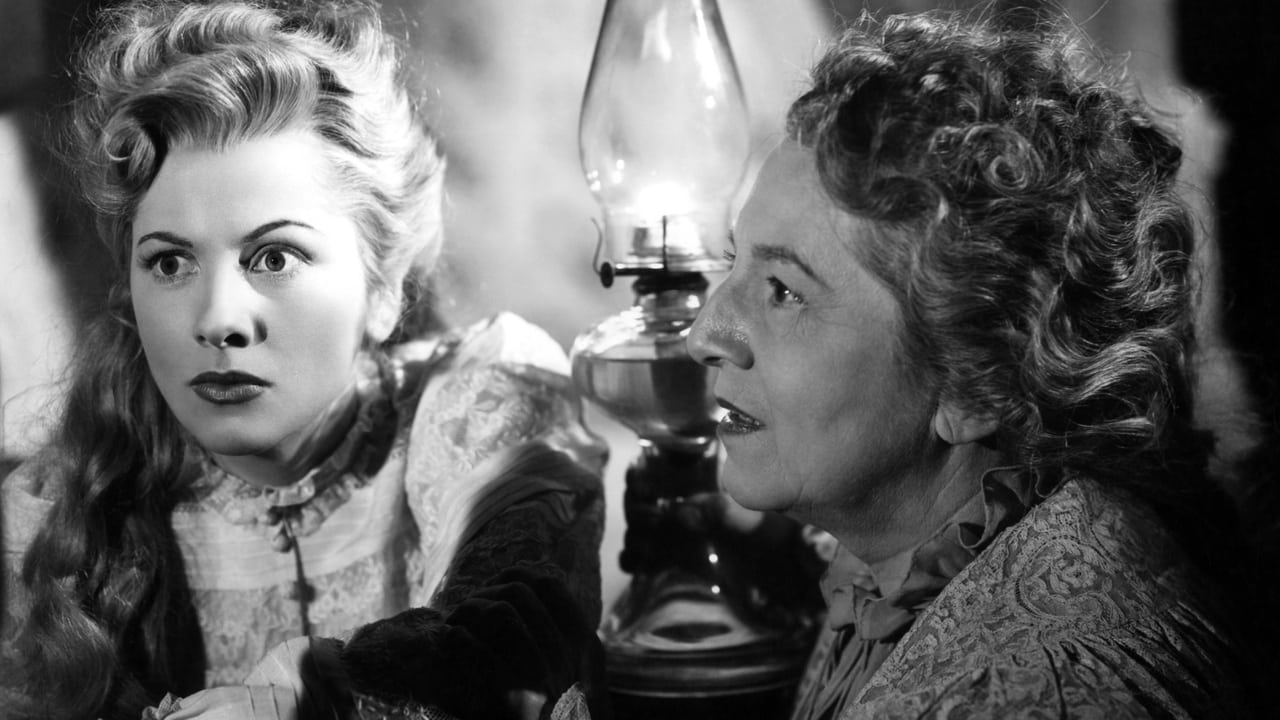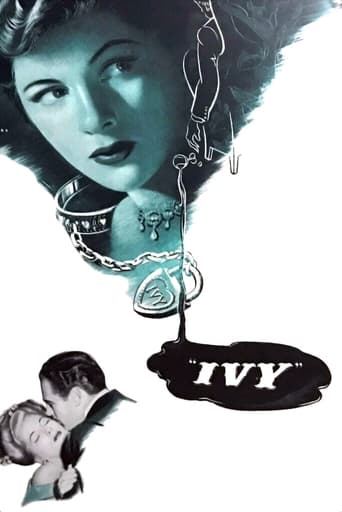Baseshment
I like movies that are aware of what they are selling... without [any] greater aspirations than to make people laugh and that's it.
Hadrina
The movie's neither hopeful in contrived ways, nor hopeless in different contrived ways. Somehow it manages to be wonderful
Teddie Blake
The movie turns out to be a little better than the average. Starting from a romantic formula often seen in the cinema, it ends in the most predictable (and somewhat bland) way.
Kirandeep Yoder
The joyful confection is coated in a sparkly gloss, bright enough to gleam from the darkest, most cynical corners.
bkoganbing
Joan Fontaine is in the title role of Ivy, a completely amoral social climber who when we meet her is juggling three different guys, husband Richard Ney, former lover Patric Knowles who can't get her out of his system, and her next interest the very rich Herbert Marshall. This girl Ivy, she really gets around.When Marshall tells her he's not having any sex with another man's wife Fontaine sees her duty clear. She not only concocts an elaborate poisoning scheme for Ney, but Knowles the dope is still so in love with her that as a doctor he's also a natural suspect. He goes to trial and shields her. Knowles doesn't know about Marshall.Ivy is a wonderful and moody Edwardian melodrama where the tension is so thick you could cut it with a knife. The cinematography is A+ in this film.A key role is the methodical Scotland Yard Inspector Cedric Hardwicke who never bought Knowles as the guilty party. Hardwicke is almost Monk like in pursuit of the truth and justice.The last 10 minutes or so contain some of Joan Fontaine's best work on the big screen as she realized the jig is up. All by herself with little or no dialog what a portrait of a woman trapped by her own deceit.Ivy should be seen for that ending and for Cedric Hardwicke.
Favog
Somebody told me this one was a good mystery, but there's no mystery at all -- the events are played straight and the audience is in on everything. Even the nice cinematography and set design and Joan Fontain's gowns and the interesting positioning of the camera behind a high-backed chair couldn't save the movie. Will Ivy get away with her schemes? Will anybody ever get around to looking inside that clock? What do you think are the chances? The William Cameron Menzies-influenced art direction goes totally overboard: Has any other movie ever featured quite so many fluffy white clouds in the sky? Even at night? What fireworks! What a potboiler! What an eye-roller. Gah.
calvinnme
Joan Fontaine is terrific as Ivy, the villainess in this superb thriller. Ivy, like the plant for which she is named, just goes wherever she can without a plan. Ultimately, Ivy is driven by greed and opportunity. How she gets what she wants - and even what she wants - she figures out as she goes along. She and her husband, Jervis Lexton, are probably still married because Jervis is a very pleasant person who always lets Ivy get her own way. They were probably married in the first place because he had money at that time, but in the past five years they both have spent it all and are now living in cheap boarding houses in London.But Ivy is socially charming and a friend gets Jervis a job in the London offices of the very wealthy Miles Rushmore (Herbert Marshall). There is instant chemistry between Rushmore and Ivy, and then he ends things from going any further saying he can have no part of taking up with another man's wife.Ivy actually has two problems. First there is the husband who is now only good for wage slave money until death do they part, but there is also a doctor, Roger Gretorix, who constantly hounds Ivy to divorce her husband and marry him. You can tell that Roger getting this obsessive about her is not something that she wanted, even before Rushmore was in the picture.Then one day while in Gretorix' surgery, Gretorix is called out on an emergency case and a bottle of poison is left out on the table. Ivy puts some of that poison in her purse and goes home. When her husband gets home from a hard day's work and asks for a brandy and soda, she poisons it and gives it to him. Now realize Ivy doesn't know anything about this poison. It might kill in seconds, it might kill in hours, it might kill in days, and it might not kill at all in the amount she is using. But she gives Jarvis another poisoned drink the next morning when he is complaining about an upset stomach, and when the doctor tells her Jervis will recover, she poisons the broth that the doctor prescribed for him. Jervis dies that night, while Ivy is at the theatre (Jervis told her to go). Now hapless Ivy has not thought about there being an autopsy ordered (there is) and what the police will do when the results come back as poisoning being the cause of death (it is).Now at first luck is on Ivy's side. Without her knowledge, Roger was the last person to see Jervis alone and alive and is instantly a suspect given his obsession over Ivy. So it looks like Ivy has a two-fer. She is free to take up with Miles Rushmore and possibly have millions to spend, AND she won't have to worry about Roger being a pest anymore as he will be hanged for the murder she did. But then her luck turns. Inspector Orpington of Scotland Yard begins to think that Ivy is not acting like a friend to Roger or a grieving widow. Plus it helps that in Edwardian England you do not need a search warrant to dig around a person's (Ivy's) home looking for evidence, even in a closed case. Orpington gets some luck too - the clock where Ivy stashed her purse stops working just as he is creeping around her flat - the clock where she hid her purse with the poison.If you think Ivy takes this in stride and just marches stoically between two police officers into jail upon arrest you'd be wrong too. I'll let you watch and see how she does ultimately take all of this.There really are marvelous performances by the entire cast. I just don't know how it could have been done any better.
highwaytourist
This is one atmospheric and visually dazzling film. The ornate sets capture the mood to perfection, even if they aren't completely accurate. Kudos to the art director. Whoever designed Joan Fontaine's wardrobe also helped the mood, even if they were not historically accurate. Also praiseworthy is the cinematography, which is in stark black-and-white and makes perfect use of light and shadow. Indeed, the film's look in some ways reminds me of the later work of Josef Von Sternberg, while some of the night scenes are like a refined version of German Expressionism. If they had been supported by a great story, this could have been a classic. What they did use was a passable romantic drama which was only mildly interesting. Here, Joan Fontaine plays a Victorian Femme Fatale whose dullard husband doesn't make enough money to keep up with her spendthrift ways. She also has a lover on the side, a doctor whose possessiveness threatens to expose their affair to her husband. She thinks she's found the lavish life she wants when she meets a wealthy bachelor at a sporting event. She convinces him to hire her unemployed husband in the London office and then designs to seduce him. However, he can't bring himself to have an affair with a married woman. What's an unhappily married gold digger to do? Well, she turns Femme Fatale and schemes to get her husband and lover both out of the way, lying and manipulating in the style made familiar by Barbara Stanwick in "Double Indemnity." Interestingly, Joan Fontaine plays her as a mild, seemingly harmless woman, a performance she repeated in "Born To Be Bad" a few years later. Problem is that there are many slow parts and the interest lags, thanks to the talky script. Also hurting is the noisy musical score, which distracts from the mood and suspense. However, it's worthwhile for fans of older movies. I usually enjoyed it.

